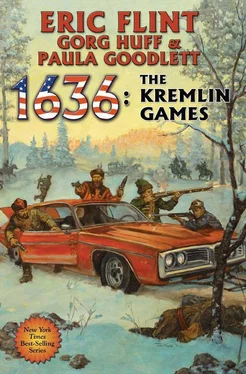Eric Flint - 1636:The Kremlin games
Здесь есть возможность читать онлайн «Eric Flint - 1636:The Kremlin games» весь текст электронной книги совершенно бесплатно (целиком полную версию без сокращений). В некоторых случаях можно слушать аудио, скачать через торрент в формате fb2 и присутствует краткое содержание. Жанр: Альтернативная история, на английском языке. Описание произведения, (предисловие) а так же отзывы посетителей доступны на портале библиотеки ЛибКат.
- Название:1636:The Kremlin games
- Автор:
- Жанр:
- Год:неизвестен
- ISBN:нет данных
- Рейтинг книги:4 / 5. Голосов: 1
-
Избранное:Добавить в избранное
- Отзывы:
-
Ваша оценка:
- 80
- 1
- 2
- 3
- 4
- 5
1636:The Kremlin games: краткое содержание, описание и аннотация
Предлагаем к чтению аннотацию, описание, краткое содержание или предисловие (зависит от того, что написал сам автор книги «1636:The Kremlin games»). Если вы не нашли необходимую информацию о книге — напишите в комментариях, мы постараемся отыскать её.
1636:The Kremlin games — читать онлайн бесплатно полную книгу (весь текст) целиком
Ниже представлен текст книги, разбитый по страницам. Система сохранения места последней прочитанной страницы, позволяет с удобством читать онлайн бесплатно книгу «1636:The Kremlin games», без необходимости каждый раз заново искать на чём Вы остановились. Поставьте закладку, и сможете в любой момент перейти на страницу, на которой закончили чтение.
Интервал:
Закладка:
It wasn’t a great speech. But it was the best Mikhail could do on the spur of the moment. Then they loaded up all the troops they could on the two steam barges that happened to be in town and headed for Bor.
Chapter 80
“We forgot to destroy the radio,” Anya said as the barge was steaming down the Oka toward the Volga and Bor.
“You can’t think of everything. It was pretty wild in Murom when we left. It was looking like war was going to break out between those who wanted to follow us and those who didn’t want to lose their homes and their businesses.”
“Besides, Sheremetev knows we didn’t try to go west, so he’ll be coming after us and there aren’t a lot of directions we can go on the river. If we ain’t going upriver, we’re going downriver.”
“Sir, sir! We need help!”
Captain Ivan Borisovich Lebedev struggled out of his drink-sodden daze, trying to understand what this idiot was talking about. “What? Let Tim handle it.”
“But he’s not here. He left with Czar Mikhail and all those people. And we’ve got fires in the city! There’s fighting.”
“Fighting about what? And why aren’t the Streltzi doing anything about it?”
“But the Streltzi are gone. Most of them.”
“Is anybody still here?”
“Well, you are.”
And that’s when it finally penetrated. Ivan Borisovich Lebedev was in charge. Really, honestly, in charge. The thing he had tried to avoid his entire life had come upon him. He needed instructions. There was no one here to give them. That’s when Ivan thought of the radio room.
Half an hour later, in the radio room, still hungover, with a half-dozen of what passed for the “leading figures” of Murom, all of them shouting at him to do something, Ivan told the radio man, “Just report to Moscow what has happened here.”
The key started tapping. The locals kept yapping. And Ivan’s head kept pounding.
“One at a time! You, what’s your complaint?” Ivan said to a short, balding man with a pot-belly.
“The servants raided my shop and ran off! I want my goods back. And my servants back! What are you going to do about it?”
“I’m going to have you thrown in the cells if you don’t quiet down. Were these your servants?”
“I was renting them,” pot-belly said. “From the Gorchakov clan.”
“So these are some of the serfs that Princess Natalia… oh, my head… that Princess Natalia freed or whatever. What was all that about?”
An older man with graying hair said, “Yes, they were. About half the work force in this town were serfs of the Gorchakov clan that were shipped in from their estates to work in the various shops.”
“So, basically, they had a perfect right to leave,” Ivan pointed out.
“Of course not. We had a contract. The Gorchakov factor signed it.”
About this time there was an explosion outside. Ivan went to the window and looked out on a small town in flames. “We’ve got bigger problems than missing serfs.” He turned back to the radio operator. “What does Moscow have to say?”
The operator shrugged. “The message probably hasn’t even gotten there yet. It has to go through seven stations to get there.”
Back in Moscow, Director-General Sheremetev was having his own problems. He had orders out to arrest Princess Natalia and Bernie for treason, and, thanks to the new patriarch, heresy. However, even four years after the up-timer’s arrival, a single station going off line could stop the word from going out. Some of the steam barges and boats on the river system had spark gap transmitters or crystal receivers, but not all of them. Not even most of them. Which meant he had no idea where they had gone once they left Murom. And he was beginning to wonder if they had gone after the czar. Meanwhile, he hadn’t heard anything from Murom in the last few hours and they weren’t answering their radio.
Murom was over two hundred miles from Moscow by road and almost four hundred by riverboat. Cavalry would take at least four days, more probably a week, to get there. Riverboats would be faster but would leave them stuck on the river once they got to Murom. Meanwhile, the Gorchakov girl was running around Russia, spreading disaffection.
“Meanwhile,” Colonel Shuvalov suggested, “we should order the Nizhny Novgorod Streltzi to arrest Princess Natalia and the up-timer.”
“Are they dependable?” Sheremetev asked.
“I don’t know,” Shuvalov admitted. “I don’t know who the commander of the local Streltzi is and we haven’t appointed a political officer to Nizhny Novgorod yet. We should have, but we’ve been stretched very thin. We have one in Bor just across the river, but that’s because of the dirigibles. There may be some loyalty to the Gorchakov clan since the industry that is developing there comes in large part from the Dacha. How much loyalty that will buy is anyone’s guess.”
“Well, find out who is in command of the Streltzi there. That should tell us something.”
It took Colonel Shuvalov a few minutes to find out and it turned out that the Streltzi commander at Nizhny Novgorod was a bureau man, not a deti boyar. Just a bureaucrat trying to keep his head down.
“Send the orders under the authority of the Boyar Duma and the director-general, acting for Czar Mikhail, as usual,” Sheremetev said. “That should give us the far end of the pincer.” Sheremetev drew a line on the map with his finger going from Nizhny Novgorod up to Kineshma then sweeping the whole hand back toward Moscow. “Meanwhile, we need to get troops on their way from here. I want you to lead the cavalry contingent. And find me somebody trustworthy to take a couple of companies of infantry by riverboat.”
Sheremetev drew his finger along the map again, this time tracing the Moskva River to where it joined the Oka, and on up the Oka to Murom. “The riverboat will probably get there before your cavalry does. They will have farther to go, but steam engines don’t get tired.”
“I’ll be on my way at first light then,” Shuvalov said. “Soonest started, soonest finished.”
Dawn came and the cavalry and the riverboats left, and still no word from Murom. They weren’t answering their radio nor forwarding messages in any direction. That, unfortunately, wasn’t that unusual. The radio telegraph links were new and didn’t have nearly enough redundancy. Well, Murom did. It was the hub for its area because it had the greatest range and because it was the Gorchakov family seat. Which meant that as long as Murom was down, messages would have to go a long way around. So why was the Murom station not active? Sheremetev wondered. It made no sense. Had they gone back to Murom for some reason and if so why hadn’t they been arrested?
Sheremetev didn’t expect to hear from Colonel Shuvalov for four days. But, worried over the silence at Murom, he gave orders that all messages be brought to him immediately. He didn’t think to mention that the Boyar Duma no longer needed copies of the messages. And, honestly, it probably wouldn’t have made any difference if he had. Selling copies of message traffic to interested individuals was a pretty obvious supplement to a telegraph operator’s pay, and in Russia of the time a telegraph operator who wasn’t selling copies was more likely to get fired than one who was.
When the news came, it was from Murom. The clerk handed Sheremetev a stack of sheets that had been typed as they came in. He didn’t mention the file copy or the three copies that had been sold to other interested parties. He also failed to mention that the sun was up or that there was air in the room. The obvious need not be commented on. They, the original, the file copy and the copies for sale were all typed on a special typewriter developed at the Dacha for use in the radio telegraph stations. It used the Cyrillic alphabet, but was all capital letters, because the more different code groups there were, the longer the code groups needed to be and the longer it would take to send any message. As had been explained to Sheremetev many times, but it still irritated him. However, that was a minor irritation compared to what was to come.
Читать дальшеИнтервал:
Закладка:
Похожие книги на «1636:The Kremlin games»
Представляем Вашему вниманию похожие книги на «1636:The Kremlin games» списком для выбора. Мы отобрали схожую по названию и смыслу литературу в надежде предоставить читателям больше вариантов отыскать новые, интересные, ещё непрочитанные произведения.
Обсуждение, отзывы о книге «1636:The Kremlin games» и просто собственные мнения читателей. Оставьте ваши комментарии, напишите, что Вы думаете о произведении, его смысле или главных героях. Укажите что конкретно понравилось, а что нет, и почему Вы так считаете.











